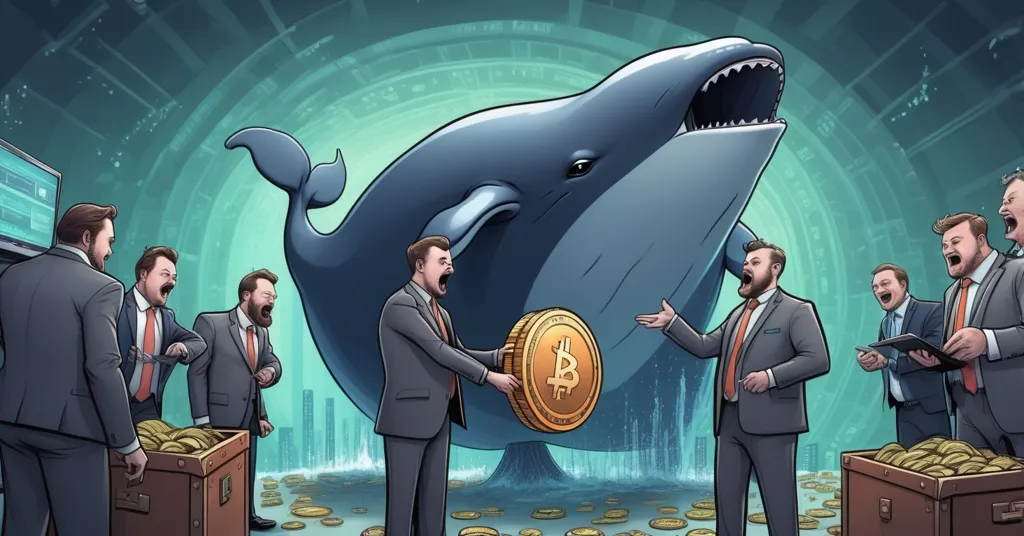Ethereum Co-Founder Moves $262M ETH to Kraken, Raising Sell-Off Concerns

Ethereum Co-Founder Transfers $262M in ETH to Kraken, Sparking Sell-Off Fears
Ethereum co-founder Jeffrey Wilcke recently made a significant move by transferring 105,732 ETH, valued at approximately $262 million, to the crypto exchange Kraken. This transaction, which took place at block height 22524638 with a minimal fee of about $0.16, has ignited concerns about a potential sell-off and added to the existing volatility in the Ethereum market.
- Jeffrey Wilcke moves 105,732 ETH to Kraken
- Amidst Ethereum’s volatile market
- Recent whale movements and Pectra upgrade concerns
Before this transfer, Ethereum had seen a slight rebound of 1.56%, reaching $2,490.44, but it quickly dipped again to $2,452. Over the past week, ETH has declined by 3.26% and remains below its recent high of $2,585. This transfer by Wilcke is not an isolated incident; it follows a pattern of significant ETH movements by other major players, such as Justin Sun and the Ethereum Foundation, contributing to market speculation and uncertainty.
Wilcke’s transfer to Kraken, a known liquidation hub for crypto whales, has sparked fears of a potential sell-off. In the crypto world, whales don’t just swim; they make waves—and sometimes tsunamis. “This substantial ETH movement has triggered speculation, as Kraken is a known liquidation hub for crypto whales,” noted one observer. Such actions by whales often signal potential market shifts, influencing investor sentiment. Imagine waking up to find your Ethereum investment suddenly plummeting. That’s the reality many faced after Jeffrey Wilcke’s recent move. The impact of such transfers on ETH price can be significant, as discussed in analyses of whale movements.
Over the past month, more than $450,000 ETH has been moved by whales, potentially swaying investor sentiment. Yet, the exact purpose of Wilcke’s transfer remains unclear. “Whether Wilcke’s transfer is for liquidation, custody, or another purpose remains unknown,” leaving the crypto community to speculate about the impact on Ethereum’s market dynamics. Discussions on platforms like Reddit highlight the community’s varied reactions to these whale movements.
Adding to Ethereum’s challenges is the waning support for its upcoming Pectra upgrade. Technical concerns, particularly around a potential bug in Ethereum Improvement Proposal (EIP) 7702, are causing hesitation. EIP-7702 aims to enhance Ethereum’s account abstraction, allowing externally owned accounts (EOAs) to delegate control to smart contract accounts (SCAs). In simpler terms, this proposal would allow for more user-friendly account management on Ethereum, similar to how you might recover a forgotten password on a website. It could offer web2-like features such as account recovery and passkey sign-in, alongside web3 benefits like gas-sponsored transactions and paying for gas in any token. However, the security model of EIP-7702 accounts, which retain the original EOA private key, is noted as a potential vulnerability. “Some experts caution that if these actions continue, Ethereum could face further downward pressure,” warned a market analyst. The technical concerns surrounding EIP-7702 are significant and warrant close attention.
While some might panic and cry ‘sell-off,’ we at ‘Let’s Talk, Bitcoin’ see this as just another day in the wild west of crypto—where fortunes are made and speculation runs rampant. Ethereum’s role in the broader ecosystem remains crucial, filling niches that Bitcoin might not serve well. Altcoins and other blockchains drive innovation and competition, pushing the boundaries of what’s possible in decentralized finance. More information on Jeffrey Wilcke can be found on his wiki page.
Despite these challenges, Bitcoin continues to solidify its role as the leading cryptocurrency. Such events in Ethereum could potentially shift investor focus back to Bitcoin, highlighting its stability and position as a safe haven in the crypto market. As we champion the ideals of freedom, privacy, and disrupting the status quo, it’s essential to approach these developments with a critical eye. The potential for a sell-off looms, but it’s also a reminder of the dynamic nature of cryptocurrencies and the importance of staying informed and engaged. For a comprehensive guide on the Pectra Upgrade, see this Quora post.
Key Takeaways and Questions
- What impact could Jeffrey Wilcke’s transfer of ETH to Kraken have on Ethereum’s price?
The transfer raises concerns about a potential sell-off, which could further pressure Ethereum’s price downward, especially given Kraken’s reputation as a liquidation hub for crypto whales.
- How does the recent movement of ETH by whales like Justin Sun and the Ethereum Foundation contribute to market speculation?
These high-volume movements by major players often signal potential market shifts, leading to increased speculation and uncertainty about future price movements.
- What are the current concerns surrounding the Pectra upgrade and EIP-7702?
The Pectra upgrade is losing support due to concerns over a potential bug in EIP-7702, which could impact Ethereum’s development and market perception. However, EIP-7702 aims to enhance account abstraction and usability, offering significant benefits if the bug is resolved. For more on the technical details of the Pectra Upgrade, see this resource.
- How might the overall market sentiment be affected by the recent whale-driven ETH movements?
The recent movements, including Wilcke’s transfer, could sway investor sentiment toward fear of another price dip, influencing Ethereum’s market dynamics in the near term.
- What role does Bitcoin play in the context of these Ethereum developments?
Bitcoin continues to serve as a stable anchor in the crypto market, potentially attracting investors wary of Ethereum’s volatility and technical challenges.
- How can we encourage critical thinking about these events?
It’s important to consider both the immediate market reactions and the long-term implications of such events. Are these moves indicative of broader trends, or are they isolated incidents? What steps should investors take to protect their investments in light of these developments?



